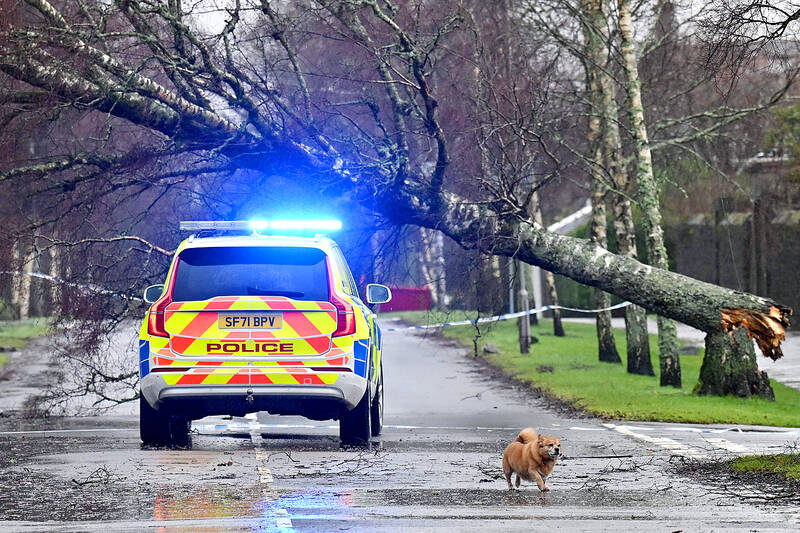Millions of people in Ireland and northern parts of the UK on Friday heeded the advice of authorities to stay home in the face of hurricane-force winds that disabled power networks and brought widespread travel disruptions.
Forecasters had issued a rare “red” weather warning, meaning danger to life, across the whole island of Ireland and central and southwest Scotland.
Ireland bore the brunt of the storm first, as it was hit with wind gusts of 183kph, the strongest since World War II, as a winter storm spiraled in from the Atlantic before hitting Scotland.

Photo: AFP
A man died after a tree fell on his car in County Donegal in the northwest of Ireland, local police said.
City centers, such as Dublin in Ireland, Belfast in Northern Ireland and Glasgow in Scotland were eerily quiet, much like the early days of the COVID-19 pandemic, as shops stayed closed and people heeded the advice to not venture out.
For those that did leave home and were caught in one of the wind gusts, it was a struggle to stay upright.
“I want to thank members of the public for largely following Police Scotland’s advice not to travel,” Scottish First Minister John Swinney said.
More than 1 million homes, farms and businesses on the island of Ireland and Northern Ireland were without power as record-breaking wind speeds swept across the island. A further 100,000 customers in Scotland were also reported to have lost power.
Schools were closed and trains, ferries and more than 1,000 flights were canceled in the Republic of Ireland and the UK, even as far south as London Heathrow, as the system, named Storm Eowyn by weather authorities, roared in.
The disruption was set to last through yesterday.
ScotRail said the storm caused significant damage to infrastructure and that a full assessment of the network would need to be done, which would include the removal of debris.
Ireland’s weather office, Met Eireann, said the 183kph gusts early on Friday were recorded at Mace Head on the west coast, beating a record of 182kph set in 1945. Wind speeds in Scotland were slightly lower through the day, although still historically high.
Part of the storm’s energy originated with the system that brought historic snowfall along the Gulf Coast of the US, said Jason Nicholls, lead international forecaster at the private weather company AccuWeather.
Scientists say that pinpointing the exact influence of climate change on a storm is challenging, but all storms are happening in an atmosphere that is warming abnormally fast due to human-released pollutants like carbon dioxide and methane.
“As the climate gets warmer, we can expect these storms to become even more intense, with greater damages,” said Hayley Fowler, a professor of climate change effects at Newcastle University.

ELECTION DISTRACTION? When attention shifted away from the fight against the militants to politics, losses and setbacks in the battlefield increased, an analyst said Recent clashes in Somalia’s semi-autonomous Jubaland region are alarming experts, exposing cracks in the country’s federal system and creating an opening for militant group al-Shabaab to gain ground. Following years of conflict, Somalia is a loose federation of five semi-autonomous member states — Puntland, Jubaland, Galmudug, Hirshabelle and South West — that maintain often fractious relations with the central government in the capital, Mogadishu. However, ahead of elections next year, Somalia has sought to assert control over its member states, which security analysts said has created gaps for al-Shabaab infiltration. Last week, two Somalian soldiers were killed in clashes between pro-government forces and

Ten cheetah cubs held in captivity since birth and destined for international wildlife trade markets have been rescued in Somaliland, a breakaway region of Somalia. They were all in stable condition despite all of them having been undernourished and limping due to being tied in captivity for months, said Laurie Marker, founder of the Cheetah Conservation Fund, which is caring for the cubs. One eight-month-old cub was unable to walk after been tied up for six months, while a five-month-old was “very malnourished [a bag of bones], with sores all over her body and full of botfly maggots which are under the

BRUSHED OFF: An ambassador to Australia previously said that Beijing does not see a reason to apologize for its naval exercises and military maneuvers in international areas China set off alarm bells in New Zealand when it dispatched powerful warships on unprecedented missions in the South Pacific without explanation, military documents showed. Beijing has spent years expanding its reach in the southern Pacific Ocean, courting island nations with new hospitals, freshly paved roads and generous offers of climate aid. However, these diplomatic efforts have increasingly been accompanied by more overt displays of military power. Three Chinese warships sailed the Tasman Sea between Australia and New Zealand in February, the first time such a task group had been sighted in those waters. “We have never seen vessels with this capability

‘NO INTEGRITY’: The chief judge expressed concern over how the sentence would be perceived given that military detention is believed to be easier than civilian prison A military court yesterday sentenced a New Zealand soldier to two years’ detention for attempting to spy for a foreign power. The soldier, whose name has been suppressed, admitted to attempted espionage, accessing a computer system for a dishonest purpose and knowingly possessing an objectionable publication. He was ordered into military detention at Burnham Military Camp near Christchurch and would be dismissed from the New Zealand Defence Force at the end of his sentence. His admission and its acceptance by the court marked the first spying conviction in New Zealand’s history. The soldier would be paid at half his previous rate until his dismissal